Michael J. Roueche's Blog, page 11
October 11, 2012
Competition and Rewards Bad. Can it be? Even for Kids?
Years ago I read a book that changed my world vision. I don’t remember why I read it, but it changed how I looked at my own kids and people I worked with. It was by a guy named Alfie Kohn. I know what you’re thinking. I thought the same thing–and no offense meant to Mr. Kohn–but how can you take something serious when the author goes by the first name of Alfie: It’s got to be pop psychology. Once I got into his book Punished by Rewards, I never again had that thought.
My take away (still fresh in my mind all these years later) is that when we give rewards (basically gimmicks) to people (kids and adults) for doing something, we may get them to behave in a certain way in the short-term, but at the same time we are destroying their intrinsic motivation to do that thing.
I still repeat–when required–the anecdote he called “an old joke” : An old man is being harassed daily by 10-year-old kids as they pass by his house. Getting tired of the insults about how “stupid or ugly or bald” he is, he calls them over and offers each a dollar if they will do the same the next day. Of course they’re up for it and perform admirably, and he pays them; and he responds to their splendid performance by offering 25 cents to each if they will behave the same the next day. Again, a superb performance and outstanding insults. And he rewards their behavior with a new offer: He can only pay a penny for the same effort. “The kids looked at each other in disbelief. ‘A penny?’ they repeated scornfully. ‘Forget it!’ And they never came back again.”
I would highly recommend the book to parents and anyone who’s giving out rewards.
I thought of Mr. Kohn because he was quoted this morning in a New York Times article on competition, spouting one of his other provocative claims that appeared in his first book, No Contest: The Case Against Competition. The Times quotes him as saying,
“The evidence overwhelmingly suggests that competition is destructive, particularly, but not exclusively, for children,” said Alfie Kohn, an author and speaker whose views on the negative aspects of competition are widely followed in the field of parenting. “It’s a toxic way to raise children….The absence of competition seems to be a prerequisite for excellence in most endeavors, contrary to received wisdom.”
After reading these two books, I’m convinced that his arguments against rewards and competition are not naive, but are well thought out, nuanced and supported by research. I recommend them (and today’s Times article) to all parents.
October 8, 2012
Midwest Book Review Names Beyond the Wood “a unique brand of romance”
Midwest Book Review, a premier reviewer of independently published books around since 1976, just published its review of Beyond the Wood. It’s included in Reviewer’s Choice selections for their October 2012 “Small Press Bookwatch.”
Here’s what they had to say:
“War often makes strange bedfellows of us all. Beyond the Wood is a novel of the American Civil War, as Hank, a Union soldier, takes a fallen Confederate Soldier’s last letter and seeks to deliver it to his widow. Aggressive, Hank puts the new widow in an unusual predicament. Their situation grows unique, as Michael J. Roueche presents a tale of personal intrigue and a unique brand of romance, recommended. Beyond the Wood is a fine addition to historical fiction collections.”
I particularly liked ”a fine addition to historical fiction collections.”
October 5, 2012
Just Ignore the Little Stuff (at Your Own Peril)
I woke up this morning to the season’s first snow and freezing temperatures (one of the disadvantages to living at 6,000 feet; also hard to grow tomatoes that actually fruit). I was feeling pretty content having had the irrigation system blown out early this year, then I remembered the guy who blew out the system reminded me to turn off the water source–I did–and to drain the remaining water out of the “backflow” (the backflow is the expensive-to-replace part of the system). I’d totally forgotten to drain the water. It was just a little thing, quick and easy to do, but I’d totally forgotten it. I immediately drained it and don’t think it was nearly cold enough to have cracked the backflow, but we’ll have to wait and see.
The experience reminded me how easy it is to focus on the most visible stuff in our lives and ignore the small things: sometimes (maybe often) ignoring them creates the big problems we face later on.
For me, a couple of the daily little things that bring happiness and help me avoid the big problems of life is thoughtful prayer and studying scripture. I can do everything else thoroughly–lots of good stuff, but if I don’t sequester myself to commune with Deity in these two ways daily, it’s at my own peril.
October 4, 2012
Denver Post Carries Blog on Civil War Re-enactment
Last month, I blogged on the Civil War Re-enactment that took place in Parker, Colorado September 15 and 16. The YourHub section of the Denver Post picked it up for today’s paper. You can find it on-line as well.
October 3, 2012
Another Virginia Newspaper Highlights “Beyond the Wood”
Hometown newspaper–which didn’t exist when it was my hometown–announced that “Beyond the Wood” received the Cooke Fiction Award yesterday. Which was more exciting? Last night’s debate, the Nationals winning the division and home-field advantage or the article. You decide. (For me, the Nationals news wins hands down, but we are truly grateful for the article.)
September 25, 2012
Virginia’s LoudounTimes.com does article on “Beyond the Wood”
I was grateful to learn this morning that the Loudoun Times newspaper posted an article about the Cooke Fiction Award and “Beyond the Wood” on its website. We spent so many years in Loudoun that–especially because we raised our family there–part of us will always consider Loudoun home. (We especially miss October, the fall colors, fresh apples and friends and neighbors.)
September 22, 2012
A Grossly Villainous Stereotype and a Wise Woman
This week I finished The Merchant of Venice. There is a lot to appreciate in this play—it leaves much to think about, some great quotes, at least one great character, but . . . I’ve got to stop there till I’ve ranted a bit:
In 2012, the one idea that oozes disgustingly from this work more than anything else is that Shakespeare must have been in this play reflecting, promoting and increasing the horrendous antisemitism that existed in England circa 1600. Judging from Shylock’s—the wealthy Jewish merchant—words, deeds and the way others treat him and scorn him, there was a lot of hate directed at the Jewish community. I came away with the impression that Shylock was a personification of what Christian England saw when they imagined someone Jewish and the Jewish religion—after all, they probably didn’t actually see many Jewish people in Shakespeare’s day since Jews had been expelled from England for 300 years. I cannot like this play because of this ignorant, biased, vicious caricature of a religion and people. I wonder if our current culture doesn’t offer direct descendants of this approach, just tuning the mocking of religion and groups of people to the ear of a modern audience.
The amazing contrast in this play to the unkind portrayal of a Jewish merchant is Shakespeare’s treatment of women. The true hero (almost a super hero), the savior of nearly everyone else in the play, is Solomon-wise, independent, pleasingly manipulative Portia who is most kind and loving—except toward Shylock. Of course, she had to be manipulative because she had to exercise all her wisdom, influence and control indirectly, secretly and subtly in the culture where Shakespeare placed her.
The themes that I saw as I read The Merchant of Venice are justice versus mercy—we must give and hope for mercy–and the importance of keeping oaths and promises —all taught to us by Portia.
The Merchant of Venice (balancing its very negative and positive attributes carefully) earns 2 Bards:

Quotes that appealed to me for various reasons (and a brief thought on a few of them):
Antonio: “I know not why I am so sad: It wearies me; you say it wearies you; but how I caught it, found it, or came by it, what stuff ’tis made of, whereof it is born, I am to learn; and such a want-wit sadness makes of me that I have much ado to know myself.”
Gratiano: “You have too much respect upon the world: They lose it that do buy it with much care.”
Bassanio: “Gratiano speaks an infinite deal of nothing…His reasons are as two grains of wheat hid in two bushels of chaff: you shall seek all day ere you find them; and, when you have them, they are not worth the search.”
Nerrissa: “…they are as sick that surfeit with too much as they that starve with nothing. It is no mean happiness, therefore, to be seated in the mean….” (One of the first arguments for the middle class?)
Portia: “If to do were as easy as to know what were good to do, chapels had been churches, and poor men’s cottages princes’ palaces. It is a good divine that follows his own instructions: I can easier teach twenty what were good to be done, than be one of the twenty to follow mine own teaching.” (Talk is cheap.)
Gratiano: “All things that are, are with more spirit chased than enjoy’d.”
Shylock: “I am a Jew! Hath not a Jew eyes? Hath not a Jew hands, organs, dimensions, senses, affections, passions? Fed with the same food, hurt with the same weapons, subject to the same diseases, healed by the same means, warmed and cooled by the same winter and summer as a Christian is? If you prick us, do we not bleed? If you tickle us, do we not laugh? If you poison us, do we not die?” (A powerful argument against all race and creed-based prejudice, after all, in the oft-quoted words of John Donne: “No man is an island … each is a piece of the continent, a part of the main….”)
Bassanio: “The world is still deceiv’d with ornament.”
Bassanio (later in the same monologue):“There is no vice so simple but assumes some mark of virtue on his outward parts.”
Bassanio (later in the same monlogue): “…thus ornament is but the guiled shore to a most dangerous sea; the beauteous scarf veiling an Indian beauty; in a word, the seeming truth which cunning times put on to entrap the wisest.”
Portia: “This comes too near the praising of myself; therefore, no more of it….”
Duke: “How shalt thou hope for mercy, rend’ring none?”
Portia: “The quality of mercy is not strain’d; It droppeth as the gentle rain from heaven upon the place beneath: it is twice bless’d; It blesseth him that gives and him that takes: ‘Tis mightiest in the mightiest, it becomes the throned monarch better than his crown, his sceptre shows the force of temporal power, the attribute to awe and majesty, wherein doth sit the dread and fear of kings; but mercy is above this scepter’d sway,—It is enthroned in the heart of kings, it is an attribute to God himself; and earthly power doth then show likest God’s when mercy seasons justice. Therefore, Jew, though justice be thy plea consider this—that in the course of justice none of us should see salvation: we do pray for mercy; and that same prayer doth teach us all to render the deeds of mercy.” (Wonderful discussion of mercy and why we need to “render” it.)
Portia: “…as thou urgest justice, be assur’d thou shalt have justice, more than thou desir’st.” (I am sure none of us really want what we deserve. We crave mercy for ourselves. How then can we not proffer it? Reminds me of the great exchange from Oscar Wilde’s “An Ideal Husband”: Lord Caversham: “You don’t deserve her, sir.” )
Portia: “That light we see is burning in my hall: How far that little candle throws his beams! So shines a good deed in a naughty world.”
Portia: “He is well paid that is well satisfied.”
Bassanio: “Pardon this fault, and by my soul I swear, I never more will break an oath with thee.” (Would have been better if he had never broke an oath to her. Tough to re-establish trust when once an oath is broken.)
A Grossly Stereotyped, Villainous Merchant and a Wise Woman
This week I finished The Merchant of Venice. There is a lot to appreciate in this play—it leaves much to think about, some great quotes, at least one great character, but . . . I’ve got to stop there till I’ve ranted a bit:
In 2012, the one idea that oozes disgustingly from this play more than anything else is that Shakespeare must have been in this play reflecting, promoting and increasing the horrendous antisemitism that existed in England circa 1600. Judging from Shylock’s—the wealthy Jewish merchant—words, deeds and the way others treat him and scorn him, there was a lot of hate directed at the Jewish community. I came away with the impression that Shylock was a personification of what Christian England saw when they imagined someone Jewish and the Jewish religion—after all, they probably didn’t actually see many Jewish people in Shakespeare’s day since Jews had been expelled from England for 300 years. I cannot like this play because of this ignorant, biased, vicious caricature of a religion and people. I wonder if our current culture doesn’t offer direct descendants of this approach, just tuning the mocking of religion and groups of people to the ear of a modern audience.
The amazing contrast in this play to the unkind portrayal of a Jewish merchant is Shakespeare’s treatment of women in the play. The true hero (almost a super hero), the savior of nearly everyone else in the play, is Solomon-wise, independent, pleasingly manipulative Portia who is most kind and loving—except toward Shylock. Of course, she had to be manipulative because she had to exercise all her wisdom, influence and control indirectly, secretly and subtly in the culture where Shakespeare placed her.
The themes that I saw as I read The Merchant of Venice are justice versus mercy—we must give and hope for mercy–and the importance of keeping oaths and promises —all taught to us by Portia.
The Merchant of Venice (balancing its very negative and positive attributes carefully) earns 2 Bards:

Quotes that appealed to me for various reasons (and a brief thought on a few of them):
Antonio: “I know not why I am so sad: It wearies me; you say it wearies you; but how I caught it, found it, or came by it, what stuff ’tis made of, whereof it is born, I am to learn; and such a want-wit sadness makes of me that I have much ado to know myself.”
Gratiano: “You have too much respect upon the world: They lose it that do buy it with much care.”
Bassanio: “Gratiano speaks an infinite deal of nothing…His reasons are as two grains of wheat hid in two bushels of chaff: you shall seek all day ere you find them; and, when you have them, they are not worth the search.”
Nerrissa: “…they are as sick that surfeit with too much as they that starve with nothing. It is no mean happiness, therefore, to be seated in the mean….” (One of the first arguments for the middle class?)
Portia: “If to do were as easy as to know what were good to do, chapels had been churches, and poor men’s cottages princes’ palaces. It is a good divine that follows his own instructions: I can easier teach twenty what were good to be done, than be one of the twenty to follow mine own teaching.” (Talk is cheap.)
Gratiano: “All things that are, are with more spirit chased than enjoy’d.”
Shylock: “I am a Jew! Hath not a Jew eyes? Hath not a Jew hands, organs, dimensions, senses, affections, passions? Fed with the same food, hurt with the same weapons, subject to the same diseases, healed by the same means, warmed and cooled by the same winter and summer as a Christian is? If you prick us, do we not bleed? If you tickle us, do we not laugh? If you poison us, do we not die?” (A powerful argument against all race and creed-based prejudice, after all, in the oft-quoted words of John Donne: “No man is an island … each is a piece of the continent, a part of the main….”)
Bassanio: “The world is still deceiv’d with ornament.”
Bassanio (later in the same monologue):“There is no vice so simple but assumes some mark of virtue on his outward parts.”
Bassanio (later in the same monlogue): “…thus ornament is but the guiled shore to a most dangerous sea; the beauteous scarf veiling an Indian beauty; in a word, the seeming truth which cunning times put on to entrap the wisest.”
Portia: “This comes too near the praising of myself; therefore, no more of it….”
Duke: “How shalt thou hope for mercy, rend’ring none?”
Portia: “The quality of mercy is not strain’d; It droppeth as the gentle rain from heaven upon the place beneath: it is twice bless’d; It blesseth him that gives and him that takes: ‘Tis mightiest in the mightiest, it becomes the throned monarch better than his crown, his sceptre shows the force of temporal power, the attribute to awe and majesty, wherein doth sit the dread and fear of kings; but mercy is above this scepter’d sway,—It is enthroned in the heart of kings, it is an attribute to God himself; and earthly power doth then show likest God’s when mercy seasons justice. Therefore, Jew, though justice be thy plea consider this—that in the course of justice none of us should see salvation: we do pray for mercy; and that same prayer doth teach us all to render the deeds of mercy.” (Wonderful discussion of mercy and why we need to “render” it.)
Portia: “…as thou urgest justice, be assur’d thou shalt have justice, more than thou desir’st.” (I am sure none of us really want what we deserve. We crave mercy for ourselves. How then can we not proffer it? Reminds me of the great exchange from Oscar Wilde’s “An Ideal Husband”: Lord Caversham: “You don’t deserve her, sir.” )
Portia: “That light we see is burning in my hall: How far that little candle throws his beams! So shines a good deed in a naughty world.”
Portia: “He is well paid that is well satisfied.”
Bassanio: “Pardon this fault, and by my soul I swear, I never more will break an oath with thee.” (Would have been better if he had never broke an oath to her. Tough to re-establish trust when once an oath is broken.)
September 21, 2012
Drawing a Winner
Last Saturday (September 15), many of the people who visited us at the 2012 Parker Civil War Living History Days signed up for a chance to win a copy of the sequel to “Beyond the Wood,” and we promised to draw the winning name on the 150th anniversary of Antietam. We were a day late but click below to hear a little about the Battle of Antietam and find out who won. Thanks to all who entered–we hope we got everyone’s email address and name correct–and to everyone who dropped by to say hello.
September 19, 2012
He Couldn’t Believe it Was Colorado
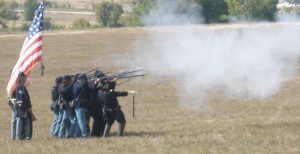
A Union volley erupts on Parker’s Reata West field.
The battle was reaching its height, rifles popping, artillery thundering and cavalry clashing, and a man excitedly approached me. He was from Florida, in town on business, a Civil War re-enactor himself, and he had seen the re-enacted battle from Parker Road as he drove by. “I can’t believe this,” he said enthusiastically. “I’ve got to send some pictures home. They won’t believe it. A re-enactment in Colorado, and I was just passing by.” The unexpected find was clearly the highlight of his day, and I saw him several times later wandering happily amid the gathered crowd.
The field didn’t look much like Virginia or Maryland, but for the thousand or more spectators over the two-day event, the warm, dry, sunny weather and the natural slope of the open grassy terrain made a perfect setting to watch nearly 90 re-enactors (musicians, soldiers and civilians) mark the war that affixed the individual states into one nation.
One-hundred and fifty years after the crucial Battle of Antietam (Sharpsburg, for you Confederate fans), soldiers skirmished with ear-assaulting artillery and peppering and smoking riffled muskets, cavalry on horseback fought with sabers, and spectators watched in rapture, not in Maryland, but on Parker’s Reata West field. Living history reaches all our senses, leaving deeper memories and impressions than ordinarily gleaned from books, lectures or tours, and the past was brought to life last Saturday and Sunday (September 15 and 16) thanks to the Parker Area Historical Society (PAHS) and the Castle Rock Civil War Unit which sponsored their third, largest and most successful annual Parker Civil War Living History Days.
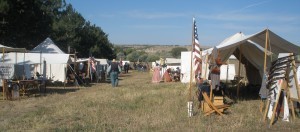
Civil War Re-enactment Camp Street
I’ve been to a number of re-enactments over the years, and this one was well-organized and easily enjoyed. I was there Saturday as spectator, fan and to sign a few copies of my Civil War novel, Beyond the Wood. Due to the latter, I was able to start my tour a little earlier than the public, and my wife, Susan, and I walked through the well-organized camp, from the tent of the abolitionist (with its slave tokens from Charleston) and its abolitionist rallys to several mercantile tents (sutler’s tents).
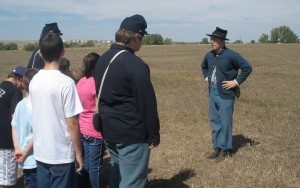
Kurt Knierim, social studies teacher from Rocky Mountain High School in Ft. Collins, instructs young, modern recruits on marching commands
The highlight of our visit along the camp road were the young people. We passed a group of young women seated outside a tent, each in period attire, and we stopped to talk about their dresses and who made them and if they would have been made by a sewing machine or by hand in the 1860s—it was concluded that while there were sewing machines, the dresses would have been made at home by hand. Only later did we learn that several of these young women were students of Kurt Knierim, a social studies teacher from Rocky Mountain High School in Ft. Collins and sponsor of that school’s Civil War club, called the Lobo Mess for the school mascot—a lobo—and for a “mess” or a group of soldiers who chose to eat together. According to Knierim, students join the group, choose their favorite part of the war to research and write 15 minute presentations. The group speaks at schools and community events, dressed in Civil War clothes. Each year, Knierim obtains grant money to fund clothing for about 10 men and 10 women in their club; impressive commitment to teaching and students. Later during the day, I saw Knierim, instructing some definitely modern and young civilians on marching commands and technique.
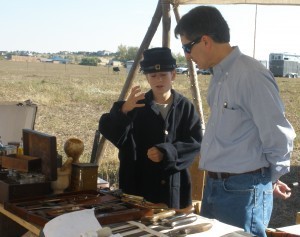
Eleven-year-old Matthew McCarthy does a great job explaining Civil War medicine and bullets to me.
We visited an open tent where 11-year old, Matthew McCarthy, a new recruit for the Castle Rock Civil War Group, explained to me displays of Minié balls (Civil War-era bullets) and the medical supplies that would have been used during the war, including some serrated saws used in the few-minutes-long amputations so popular during the war. He explained that he had been studying the war for the past four or five years, and that he was too young to be able to use a musket—“You have to be 16 to be a re-enactor,” he explained, but he was saving up to buy a drum, because you can be a drummer at age 13.
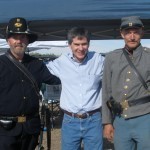
Captain Tim Brown, head of the Castle Rock Civil War Unit, in Union attire and Stephen Sheffler, also from the Castle Rock group, in Confederate attire put regional differences aside for a photo.
Tim Brown, bearded, warm and friendly captain and head of the Castle Rock Civil War Unit, Second Colorado, which had organized re-enactors from Colorado, Wyoming, Montana and New Mexico for the day’s events, indicated that the 2012 event included more than a 50 percent increase in the number of soldiers over last year and three times the number of re-enactors playing civilian roles.
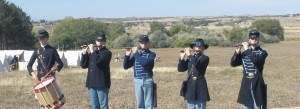
The fife and drum corps, to my surprise, was outstanding (and professional).
Mid-morning saw demonstrations of period martial music, from American Revolution tune Yankee Doodle to the Battle Hymn of the Republic—written during and for the war. They also offered a rendering of the song Abraham Lincoln requested to hear upon receiving news that Robert E. Lee had surrendered: Dixie. The performances were much higher quality than I expected, and only later did I learn that the musicians were well-trained professionals. Based on Civil War soldiers’ reports and my experience on Saturday, I am convinced that the average real music of the Civil War did not measure up to the top-notch tone or quality of what we sampled.
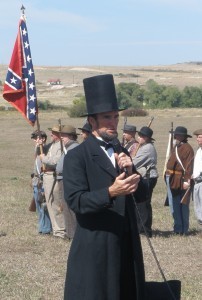
Even the Confederates listen respectfully as John Voehl as Abraham Lincoln recites the Getttysburg address.
John Voehl in his role as Abraham Lincoln was on hand for the festivities—I understand his beard was real, and he looked great, but Susan commented that he needed to have his nose enlarged for the role. (I recommend he leave his nose alone.) Voehl talked about Lincoln and spoke as Lincoln, giving a rendition of the Gettysburg address. A friend of ours, a huge Lincoln fan, who came down from Denver, was delighted to have the chance for an exchange with Mr. Lincoln.
The morning also included artillery, musket, and cavalry demonstrations and explanation and the afternoon battle included all three, and a Confederate cannon that did not want to be taken; but most importantly there were a lot of families gleefully taking in the action throughout the day.
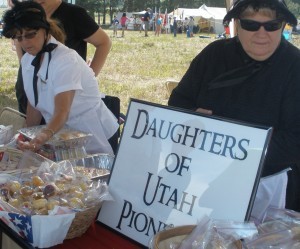
Bea Barton, left, and Ilene Hawkins, of the Daughters of Utah Pioneers serve period refreshments to participants and spectators.
Up at the book signing, I visited with Mike Mulligan, long-time friend LeiOma Koestner and Catherine Traffis of the PAHS and sampled the root-beer-like sarsaparilla (12 gallons were consumed in three ounce shots) served gratuitously by the Daughters of the Utah Pioneers. The women, mostly dressed in black, were also giving away samples of corn bread, cookies and never-the-soldier’s favorite, but often their dietary mainstay: hardtack. They could have easily sold the cookies and corn bread, but I understand why they had to give away the hardtack.
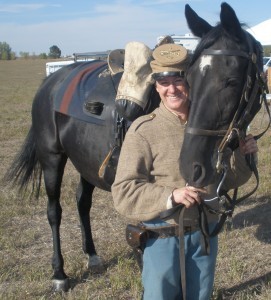
Jill Czarnowski and her horse Blue have been involved in Civil War cavalry re-enactments for 15 years.
My new friend from Florida captured the difference between this re-enactment and those he does with his unit in Florida. “We have a hard time convincing people to be Union.” Maybe it’s their weather.
Thanks to Castle Rock Civil War Unit and PAHS for sponsoring this—in the sentiment of the Floridian—extraordinary event, and thanks to all the re-enactors. We hope you keep the tradition going.
The Castle Rock Civil War Unit is a non-profit dedicated to presenting the life and times of Civil-War-era American citizens and soldiers and to educating the public and furthering serious discussion and study of the American Civil War. PAHS is a non-profit established in 1986 to research, record and preserve historic events and sites in Parker, Colo. It is located in the Parker Mainstreet Center on 19650 Mainstreet and is open on Saturdays from 10 am to noon.




